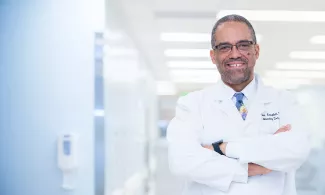Biography
Andre Campbell, M.D. is currently professor of surgery at the University of California, San Francisco, School of Medicine and an attending trauma surgeon at Zuckerberg San Francisco General Hospital and Trauma Center. He is also Vice Chair of Opportunity and Outreach in the Department of Surgery.
Campbell attended Harvard University where he received his Bachelor of Arts degree in Biology in 1980. He attended medical school at the University of California, San Francisco and received his MD degree in 1985. His formal training was at Columbia University Medical Center in New York City. Campbell is fully trained in internal medicine, general surgery, and surgical critical care. He has been on the faculty at University of California, San Francisco based at San Francisco General Hospital for the past 23 years. His research and clinical interest has been the ICU care of trauma patients, acute lung injury after trauma, the abdominal compartment syndrome, and surgical education.
Campbell is the one of the most decorated surgical educators at UCSF. He has received numerous awards from medical school students at the School of Medicine. His educational accomplishments have been celebrated both locally at UCSF and nationally. He was recognized for his educational accomplishments as a founding member of the Haile T. Debas Academy of Medical Educators. In addition, in 2003, he was appointed Endowed Chair of Surgical Education at University of California, San Francisco for two five year terms. He was previously the long time director of the third year medical student undergraduate education program all the UCSF hospitals. Campbell has directed the Surgical Critical Care Fellowship at the University of California, San Francisco for 18 years and has trained many fellows who now practice trauma, surgical critical care and acute care surgery around the United States and the World. He has also served as Medical Director of the Trauma Intensive Care Unit at San Francisco General Hospital.
Campbell was selected to serve on the Verification Review Committee of the American College of Surgeons Committee on Trauma. In addition, he serves on the Board of Governors of the American College of Surgeons. He was given the honor of presenting “The Last Lecture 2016” at UCSF by a majority of students from all five graduate programs. Campbell is a master surgeon, teacher, mentor, clinical researcher, and clinical educator in the department of surgery at UCSF.
Videos
Education
| Institution | Degree | Dept or School | End Date |
|---|---|---|---|
| University of California San Francisco School of Medicine | Diversity, Equity, and Inclusion Champion Training | 2019 | |
| UCSF, School of Medicine | Teaching Scholar | 6/2000 | |
| New York Presbyterian Medical Center | Surgical Critical Care | 6/1993 | |
| New York Presbyterian Medical Center | General Surgery Residency | 6/1992 | |
| New York Presbyterian Medical Center | Residency Internal Medicine | 6/1988 | |
| University of California, San Francisco | M.D. | Medicine | 6/1985 |
| Harvard University | AB | Biology | 6/1980 |
Board Certifications
- American Board of Internal Medicine, 1992
- American Board of Surgery, 1993
- American Board of Surgery, Surgical Critical Care, 1995
Clinical Expertise
General Surgery
Surgical Critical Care
Trauma Surgery
In the News
Research Narrative
Dr. Campbell's initial main research interest was in the basic science and clinical aspects of acute lung injury in the trauma patient. After examining the basic science aspects of the mechanism of lung injury in sheep, his research subsequently focused on the clinical aspects of lung injury in trauma patients. As part of the Traumatic Lung Injury Group, he attempted to stratify the patients who are at risk for developing ARDS by examining both systemic and local inflammatory mediators.
Currently, he is involved with research projects in the ICU evaluating the efficacy of ventilator management strategies in patients with ARDS in conjunction with the Respiratory Therapy Division at SFGH. The goal of these studies is to determine if patients benefit from pressure control ventilation over volume control ventilation if they had acute lung injury. He is now working on a number of projects examining weaning and the work of breathing patients have on different modes of ventilation.
Dr. Campbell has been a co-investigator in a study of errors reported in morbidity and mortality conference. The purpose of this study is to better characterize and understand the nature of errors and how they are presented at medical and surgical conferences. It is hoped that this study will result in improvements in the way that these conferences are conducted and analyzed.
Recently, Dr. Campbell became involved as an editorial board member of a new web based morbidity and mortality project. He was funded by the Agency for Healthcare Research and Quality for three years to develop a way to analyze nationally and report medical errors on the web. The name of the program is UCSF-DoctorQuality.com. Dr. Campbell will serve as the expert in surgery to better help systematically analyze medical and surgical errors.
Publications
- A qualitative study of micro and macroaggression experienced by Black surgical trainees through an anonymous reporting.| |
 PubMed
PubMed
- An Analysis of Political Contributions by the American College of Surgeons Professional Association (SurgeonsPAC).| |
 PubMed
PubMed
- The Society of Black Academic Surgeons membership survey: Insights on demographics, engagement, and opportunities for improvement.| |
 PubMed
PubMed
- Surgical support team: Lessons learned after piloting a near peer support program for medical students during their core surgery clerkship.| |
 PubMed
PubMed
- Corrigendum to "Advocating for a New Residency Application Process: A Student Perspective". J Surg Educ. 2022 January-February; 79(1): 20-24.| |
 PubMed
PubMed
- Third year medical student knowledge gaps after a virtual surgical rotation.| |
 PubMed
PubMed
- Advocating for a New Residency Application Process: A Student Perspective.| |
 PubMed
PubMed
- Bursting the Hidden Curriculum Bubble: A Surgical Near-Peer Mentorship Pilot Program for URM Medical Students.| |
 PubMed
PubMed
- Paying it forward: A pilot program for near-peer support for medical students during the surgery clerkship.| |
 PubMed
PubMed
- Common Injury Patterns from Standing Motorized Scooter Crashes.| |
 PubMed
PubMed
- Where Do We Go From Here? Assessing Medical Students' Surgery Clerkship Preparedness During COVID-19.| |
 PubMed
PubMed
- "Who wants me to do what?" varied expectations from key stakeholder groups in the surgical intensive care unit creates a challenging learning environment.| |
 PubMed
PubMed
- Students are watching: They see how surgical residents and attendings deal with difficult situations.| |
 PubMed
PubMed
- Near-Peer Learning During the Surgical Clerkship: A Way to Facilitate Learning After a 15-Month Preclinical Curriculum.| |
 PubMed
PubMed
- Routine computed tomography after recent operative exploration for penetrating trauma: What injuries do we miss?| |
 PubMed
PubMed
- Fragmentation of Care-The Untold Story.| |
 PubMed
PubMed
- Reconsidering the Resources Needed for Multiple Casualty Events: Lessons Learned From the Crash of Asiana Airlines Flight 214.| |
 PubMed
PubMed
- A Case of Unrecognized Intrathoracic Placement of a Subclavian Central Venous Catheter in a Patient with Large Traumatic Hemothorax.| |
 PubMed
PubMed
- American College of Surgeons/Association for Surgical Education medical student simulation-based surgical skills curriculum needs assessment.| |
 PubMed
PubMed
- Prospective randomized trial of LC+LCBDE vs ERCP/S+LC for common bile duct stone disease.| |
 PubMed
PubMed
- The value of teaching anatomy to medical students.| |
 PubMed
PubMed
- The spontaneous breathing pattern and work of breathing of patients with acute respiratory distress syndrome and acute lung injury.| |
 PubMed
PubMed
- Effects of tidal volume on work of breathing during lung-protective ventilation in patients with acute lung injury and acute respiratory distress syndrome.| |
 PubMed
PubMed
- Work of breathing during lung-protective ventilation in patients with acute lung injury and acute respiratory distress syndrome: a comparison between volume and pressure-regulated breathing modes.| |
 PubMed
PubMed
- Clinical implementation of the ARDS network protocol is associated with reduced hospital mortality compared with historical controls.| |
 PubMed
PubMed
- Acute respiratory distress syndrome criteria in trauma patients: why the definitions do not work.| |
 PubMed
PubMed
- An epidemic of methicillin-resistant Staphylococcus aureus soft tissue infections among medically underserved patients.| |
 PubMed
PubMed
- Hypertonic saline: here we go again?| |
 PubMed
PubMed
- Discussion of medical errors in morbidity and mortality conferences.| |
 PubMed
PubMed
- The development of acute lung injury is associated with worse neurologic outcome in patients with severe traumatic brain injury.| |
 PubMed
PubMed
- The effects of tidal volume demand on work of breathing during simulated lung-protective ventilation.| |
 PubMed
PubMed
- Clostridial myonecrosis cluster among injection drug users: a molecular epidemiology investigation.| |
 PubMed
PubMed


